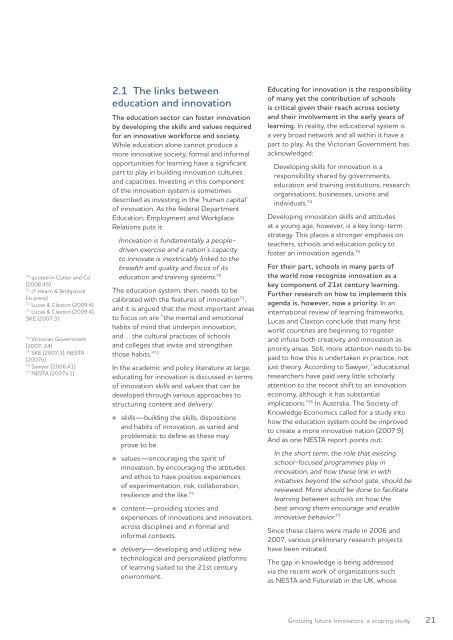GrowinG Future innovators - ARC Centre of Excellence for Creative ...
GrowinG Future innovators - ARC Centre of Excellence for Creative ...
GrowinG Future innovators - ARC Centre of Excellence for Creative ...
Create successful ePaper yourself
Turn your PDF publications into a flip-book with our unique Google optimized e-Paper software.
70 quoted in Cutler and Co<br />
(2008:45)<br />
71 cf Hearn & Bridgstock<br />
(in press)<br />
72 Lucas & Claxton (2009:4)<br />
73 Lucas & Claxton (2009:4),<br />
SKE (2007:3)<br />
74 Victorian Government<br />
(2007: 24)<br />
75 SKE (2007:3), NESTA<br />
(2007b)<br />
76 Sawyer (2006:41)<br />
77 NESTA (2007a:1)<br />
2.1 The links between<br />
education and innovation<br />
The education sector can foster innovation<br />
by developing the skills and values required<br />
<strong>for</strong> an innovative work<strong>for</strong>ce and society.<br />
While education alone cannot produce a<br />
more innovative society, <strong>for</strong>mal and in<strong>for</strong>mal<br />
opportunities <strong>for</strong> learning have a significant<br />
part to play in building innovation cultures<br />
and capacities. Investing in this component<br />
<strong>of</strong> the innovation system is sometimes<br />
described as investing in the ‘human capital’<br />
<strong>of</strong> innovation. As the federal Department<br />
Education, Employment and Workplace<br />
Relations puts it:<br />
Innovation is fundamentally a peopledriven<br />
exercise and a nation’s capacity<br />
to innovate is inextricably linked to the<br />
breadth and quality and focus <strong>of</strong> its<br />
education and training systems. 70<br />
The education system, then, needs to be<br />
calibrated with the features <strong>of</strong> innovation 71 ,<br />
and it is argued that the most important areas<br />
to focus on are “the mental and emotional<br />
habits <strong>of</strong> mind that underpin innovation,<br />
and … the cultural practices <strong>of</strong> schools<br />
and colleges that invite and strengthen<br />
those habits.” 72<br />
In the academic and policy literature at large,<br />
educating <strong>for</strong> innovation is discussed in terms<br />
<strong>of</strong> innovation skills and values that can be<br />
developed through various approaches to<br />
structuring content and delivery:<br />
skills—building the skills, dispositions<br />
and habits <strong>of</strong> innovation, as varied and<br />
problematic to define as these may<br />
prove to be.<br />
values—encouraging the spirit <strong>of</strong><br />
innovation, by encouraging the attitudes<br />
and ethos to have positive experiences<br />
<strong>of</strong> experimentation, risk, collaboration,<br />
resilience and the like. 73<br />
content—providing stories and<br />
experiences <strong>of</strong> innovations and <strong>innovators</strong>,<br />
across disciplines and in <strong>for</strong>mal and<br />
in<strong>for</strong>mal contexts.<br />
delivery—developing and utilizing new<br />
technological and personalized plat<strong>for</strong>ms<br />
<strong>of</strong> learning suited to the 21st century<br />
environment.<br />
Educating <strong>for</strong> innovation is the responsibility<br />
<strong>of</strong> many yet the contribution <strong>of</strong> schools<br />
is critical given their reach across society<br />
and their involvement in the early years <strong>of</strong><br />
learning. In reality, the educational system is<br />
a very broad network and all within it have a<br />
part to play. As the Victorian Government has<br />
acknowledged:<br />
Developing skills <strong>for</strong> innovation is a<br />
responsibility shared by governments,<br />
education and training institutions, research<br />
organisations, businesses, unions and<br />
individuals. 74<br />
Developing innovation skills and attitudes<br />
at a young age, however, is a key long-term<br />
strategy. This places a stronger emphasis on<br />
teachers, schools and education policy to<br />
foster an innovation agenda. 75<br />
For their part, schools in many parts <strong>of</strong><br />
the world now recognize innovation as a<br />
key component <strong>of</strong> 21st century learning.<br />
Further research on how to implement this<br />
agenda is, however, now a priority. In an<br />
international review <strong>of</strong> learning frameworks,<br />
Lucas and Claxton conclude that many first<br />
world countries are beginning to register<br />
and infuse both creativity and innovation as<br />
priority areas. Still, more attention needs to be<br />
paid to how this is undertaken in practice, not<br />
just theory. According to Sawyer, “educational<br />
researchers have paid very little scholarly<br />
attention to the recent shift to an innovation<br />
economy, although it has substantial<br />
implications.” 76 In Australia, The Society <strong>of</strong><br />
Knowledge Economics called <strong>for</strong> a study into<br />
how the education system could be improved<br />
to create a more innovative nation (2007:9).<br />
And as one NESTA report points out:<br />
In the short term, the role that existing<br />
school-focused programmes play in<br />
innovation, and how these link in with<br />
initiatives beyond the school gate, should be<br />
reviewed. More should be done to facilitate<br />
learning between schools on how the<br />
best among them encourage and enable<br />
innovative behavior. 77<br />
Since these claims were made in 2006 and<br />
2007, various preliminary research projects<br />
have been initiated.<br />
The gap in knowledge is being addressed<br />
via the recent work <strong>of</strong> organizations such<br />
as NESTA and <strong>Future</strong>lab in the UK, whose<br />
Growing future Innovators: a scoping study 21




![Plebiscite (Riegert chapter) revised FINAL [Feb 14].pdf](https://img.yumpu.com/8710373/1/190x245/plebiscite-riegert-chapter-revised-final-feb-14pdf.jpg?quality=85)